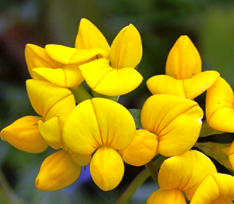![]() Lotus Corniculatus Flower Extract
Lotus Corniculatus Flower Extract
Rating : 6.5
Lotus Corniculatus Flower Extract is extracted from the plant Lotus corniculatus, a member of the Fabaceae family, native to the temperate climate of Eurasia and North Africa, which flowers from June to August with clusters of yellow flowers.Its major constituents are phenolic acids, saponins, flavonoids, tannins.Lotus Corniculatus is used as anima... (Read the full Tiiip)
8 pts from Street82
| Evaluate | Where is this found? |
| "Descrizione" about Lotus Corniculatus Flower Extract Review Consensus 8 by Street82 (2970 pt) | 2022-Jan-04 10:40 |
Lotus Corniculatus Flower Extract is extracted from the plant Lotus corniculatus, a member of the Fabaceae family, native to the temperate climate of Eurasia and North Africa, which flowers from June ...
| Read the full Tiiip | (Send your comment) |
Read other Tiiips about this object in __Italiano (1)
Component type: Chemical Main substances: Last update: 2022-01-04 10:23:07 | Chemical Risk: |



